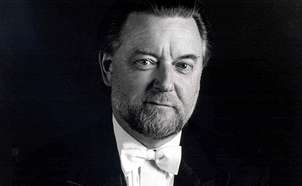|
Back
A Cambridge Connection London
Royal Albert Hall
07/22/2009 -
Ralph Vaughan Williams: The Wasps, Overture – Five Mystical Songs
Ryan Wigglesworth: The Genesis of Secrecy (world premiere)
Charles Villiers Stanford: Magnificat and Nunc dimittis in A major
Jonathan Harvey: Come, Holy Ghost
Judith Weir: Ascending into Heaven
Camille Saint-Saëns: Symphony No.3, "Organ"
Simon Keenlyside (baritone), Thomas Trotter (organ)
Choirs of King's and St John's colleges, Choirs of Clare, Gonville and Caius, and Trinity colleges, Choirs from combined Cambridge colleges, BBC Symphony Orchestra, Sir Andrew Davis (conductor), Stephen Cleobury† (conductor), Andrew Nethsingha (conductor)

Sir Andrew Davis (© Jim Four)
The University of Cambridge turns 800 this year. Believed to have awarded the first Bachelor of Music degree (in 1464), the university is also the connection between all the composers, conductors, soloists and choirs in this concert. The Cambridge connection is stronger in some cases than others: of the composers, Vaughan Williams, Stanford, Harvey and Weir are alumni, Wigglesworth is a lecturer, and Saint-Saëns once conducted a concert there (although he was awarded an honorary degree for his efforts). Davis, Keenlyside and Trotter also all studied at Cambridge, and the chorus was conflated from the choirs of various colleges. Some critics have questioned the BBC's decision to centre a concert around one single university – will all universities in the UK be offered a Prom concert for significant anniversaries? – but in truth, for many of us in the audience, this was irrelevant, and the draw was simply an interesting programme combining the new (Wigglesworth, 2009) with an old favourite (Saint-Saëns).
Vaughan Williams wrote the score to Aristophanes' The Wasps for a 1909 college production. The overture mixes the modal patterns of English folk music with contemporary French influences, and requires quite a firm hand from the conductor and superb ensemble playing from the orchestra to maintain structure and avoid dissolving into mush. Fortunately, these were both present, Davis conducting with a steady tempo but a light touch, so the piece moved along well; the strings perfectly together during the pizzicato and spiccato passages. The woodwind blended seamlessly, with individual parts unobtrusively emerging for solos, such as Daniel Pailthorpe's gentle woody-toned flute.
The second piece had the excitement of a world premiere, Wigglesworth's The Genesis of Secrecy being a BBC commission composed earlier this year. The composer has described how he “began by appropriating and gathering various fragments from works [he] had long admired”, finding and developing connections between them, and forming the “shards” into a new musical narrative, with his own music then covering the original fragments until they were obscured completely. I was certainly unable to pick out the work of any other composers, although elements of the composer's own Tenebrae were present, for example in a cor anglais solo near the start – played beautifully by Alison Teale. This was a piece of shifting textures, often languid but with small waves of tension passing through, for example, long sustained string lines topped by patches of stippled woodwind, or with some combination of sounds from the five percussionists.
Next was the return of Vaughan Williams, this time in the shape of a short song cycle set to the poems of George Herbert (1593-1633) – yes, another Cambridge graduate. Simon Keenlyside was in good voice, strong and resonant yet imbuing the simple melodies with a sense of intimacy – an achievement in the huge space of the Albert Hall. It really was a shame that his time on stage was so short! The massed choirs provided accompaniment, particularly effectively in I got me flowers. However, to my ears, the balance of parts seemed weighted towards the soprano end, and would have benefited from more volume from the lower voices.
After the interval followed three shorter pieces for the various choirs, during which a phalanx of trebles were added, and in which the Directors of Music from King's and St John's Colleges took their turns on the podium. Stanford's Magnificat and Nunc dimittis was pleasant to the ear but somewhat lacking in presence and energy. Harvey's Come, Holy Ghost, however, was riveting. Although early on there were some small inaccuracies of intonation in the top treble lines, these soon disappeared, and the sound was solid and confident. An early “plainchant-style” tenor solo was particularly effective, as was the section where percussive rhythmic consonants first began to enter, signalling the transformation into a more complex and chromatic soundscape. Weir's Ascending into Heaven, written during the 1980’s, but based on a medieval Latin hymn, completed the choral part of the concert. Using modal structures reminiscent of Messiaen, it also included, as suggested by the title, many ascending lines, including swoops and almost-shrieks from the voices. The organ part was quite independent, and utilised some interesting timbres, including one which sounded remarkably like a 1980s synthesiser.
After what may to many of the audience have been unfamiliar music, the final piece chosen was a well-loved old favourite. Again, the orchestra were a model of precision in the repeated semiquaver entries (which have been known to derail the occasional band), and in their articulation. Although musically played throughout, I found the first movement (the programme listed the symphony in its four-movement version) somewhat restrained, and the slow second lost its shape a little. However, in the third movement the piece really came to life, with vigour and style. Again, the woodwind section were particularly strong, with Chris Cowie's oboe a highlight. I was definitely not the only audience member to break into a big grin when the Albert Hall organ came crashing in, in its full glory, at the start of the fourth movement, and probably also not the only one to follow it with goosebumps at the piano entry eight bars later. The grin remained in place for the rest of the symphony, and for some minutes after it ended.
The Proms 2009
Carla Finesilver
|